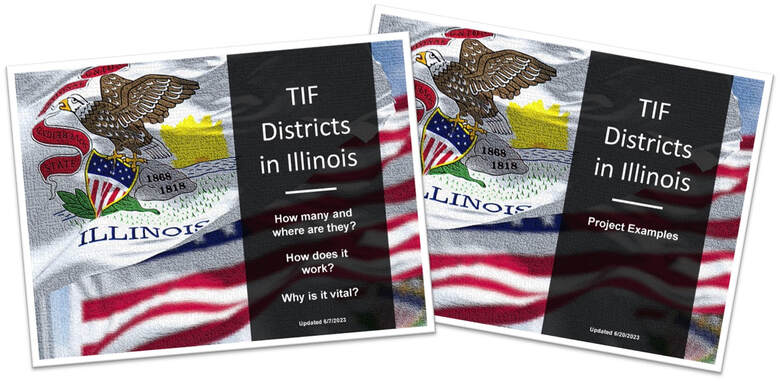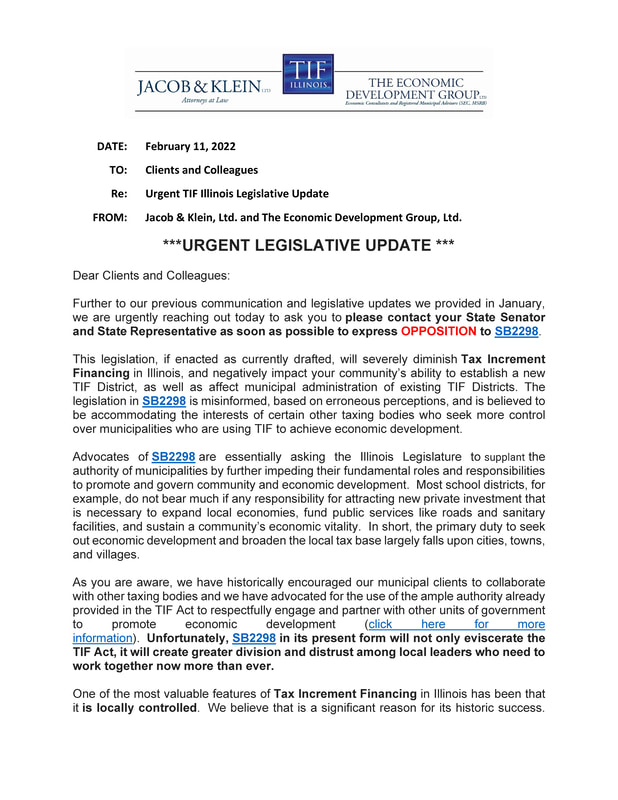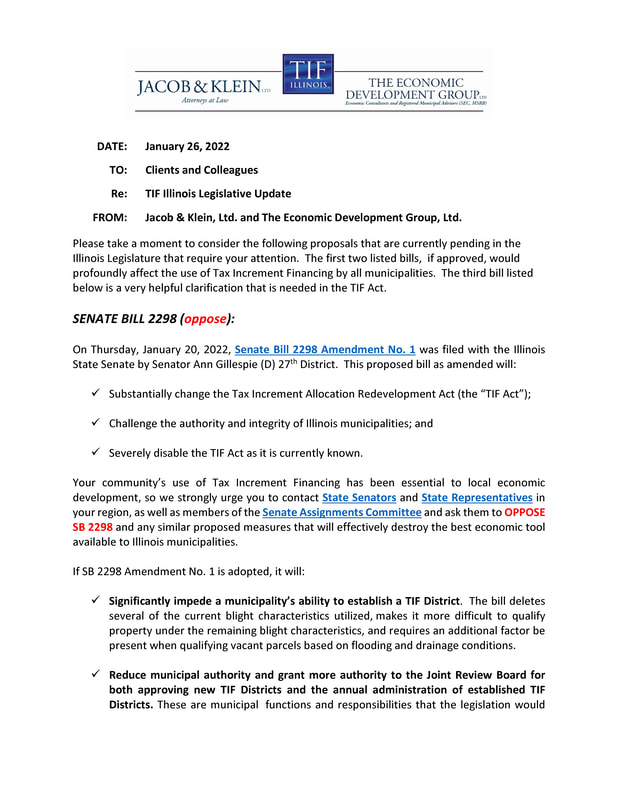Spring-2023
TIF-Related Legislative Updates
(103rd Illinois General Assembly)
SB 1391 - TIF/REDEVELOPMENT PROJECT AREA (OPPOSE)
- The Executive Hearing scheduled on 3/29/2023 was postponed and SB1391 was Re-referred to the Assignments Committee on 3/31/2023.
- A HEARING FOR THE ILLINOIS STATE SENATE EXECUTIVE COMMITTEE IS SCHEDULED ON WEDNESDAY, MARCH 29, 2023 AT 3:00 P.M. regarding SB1391 Amendment #2 as was filed on 3/27/2023. Jacob & Klein, Ltd. and The Economic Development Group, Ltd. encourage municipal officials to file a witness slip in opposition to this bill, which can be done on the General Assembly's website (click here to file a witness slip).
- SB1391 Amendment #2 includes several provisions which are objectionable and would harm a municipality's use of TIF, such as:
- It is unclear what new Section 2.5 (65 ILCS 5/11-74.4-3(n)) on page 27 of Amendment #2 requires and how such is to be applied. It purports to establish a “process” for allocating TIF funds that includes the JRB members. The language lacks clarity and does not define what constitutes a “process.”
- The changes to 65 ILCS 5/11-74.4-3.5 on page 61 of Amendment #2 limiting a TIF extension to 10 years, as opposed to 12 years makes no sense in promoting economic development. If a project utilizes a common 10-year financing structure, this has the effect of only allowing 7-8 years of TIF revenue to be available due to the lag in property tax assessment and when real estate tax is collected. The corresponding change on page 87 of Amendment #2 prohibiting a 2nd TIF extension is also problematic. Why should the State legislate a prohibition on an extension if all of the local taxing districts are in support of such? The local taxing districts are in the best position to evaluate the necessity and impact to the community in considering a 2nd extension.
- The change to 65 ILCS 5/11-74.4-5 (b) on page 97 of Amendment #2 prohibiting the establishment of a new TIF redevelopment project area unless every member of the Joint Review Board approves when the new area overlaps with an existing TIF District, should be opposed. Numerous economic and/or property factors may cause a redevelopment project to be delayed or not fully develop, thereby warranting the possible inclusion of that property in a new TIF redevelopment project area.
- The language beginning on page 121 of Amendment #2 as relates to 65 ILCS 5/11-74.4-8 requires a subtraction of TIF EAV that is attributable to the change in Equalized Assessed Valuation (EAV) caused by the previous 12-month Consumer Price Index. From a practical perspective, it is unclear how County Officials would necessarily have knowledge of or be able to ascertain on a parcel-by-parcel basis the extent to which a parcel’s EAV increase was attributable to a property improvement, an increase in EAV due to comparable property sales, a CPI increase, or some other factor or combination of factors. This is particularly concerning due to the recent high CPI rates. This language could also have the effect of harming small businesses, for whom Amendment #2 seeks to assist in other sections, as many small business improvements that are undertaken on older properties often do not result in significant increases in assessed valuation.
- We encourage municipalities to OPPOSE SB1391 in its current form as amended, adopt a resolution in support of tax increment financing, and submit such to the Illinois Municipal League. The IML's suggested language for the resolution is available by clicking here.
- SB1391 was originally filed by Sen. Ann Gillespie, D-Arlington Heights, on 2/6/2023 has is currently re-assigned to the Executive Committee. The Illinois Municipal League (IML) issued an update relating to SB1391 on 2/8/2023 (click here to review IML's assessment of the original Bill) and will continue to post updates to its Statehouse Briefings as more information becomes available. SB1391 proposes numerous changes to the TIF Act which will be incalculable or impossible to administer, and generally counterproductive to a municipality's authority and use of tax increment financing throughout Illinois.
- Municipal leaders are encouraged to immediately contact their local legislators to express concerns about SB1391 as currently proposed. Jacob & Klein, Ltd. and The Economic Development Group, Ltd. are regularly communicating with IML, undertaking a thorough review of SB1391, and will continue to monitor the Bill.
HB 1115 - TIF-REDEVELOPMENT PROJECT COST (OPPOSE)
- HB1115 was referred to the Revenue - Property Tax Subcommittee on 2/7/2023, and on 3/10/2023 it was Re-referred to the Rules Committee.
- HB1115 filed by Rep. Lance Yednock, D-Ottawa, on 1/9/2023 is currently assigned to the Rules Committee. HB1115 proposes to modify the default formula in the TIF Act as relates to authorizing municipalities to assist elementary, secondary, or unit school districts with addressing increased costs attributable to assisted housing units located within a TIF redevelopment project area that generate new student enrollment. The Bill eliminates the concept of counting the "net" new students attributable to TIF-assisted housing. HB1115 specifically proposes to adjust the per capita reimbursement calculation by increasing the "not to exceed" percentage amounts as follows: the current 25% to become a cap of 40% of related TIF increment for unit school districts; the current 17% to become a cap of 27% of related TIF increment for elementary school districts; and the current 8% to become a cap of 13% of related TIF increment for secondary school districts. Jacob & Klein, Ltd. and The Economic Development Group, Ltd. encourage municipal leaders to contact local legislators to OPPOSE HB1115 as currently drafted.
Spring-2022 TIF-Related Illinois Legislative Updates
(102nd General Assembly)
- SB0658, as of 4/7/2022, includes the statutory language for clarifying the definition of "contiguity" for TIF Redevelopment Project Areas that SB3106 addressed. House Amendment No. 4 was then referred to the Rules Committee on 4/7/2022. The Bill moved to House Executive Committee and subsequently PASSED both houses during final Session on 4/9/2022. The Bill was signed by the Governor on 5/13/2022, thereby becoming Public Act 102-0818.
- SB2298 Senate Floor Amendment No. 2 Pursuant to Senate Rule 3-8 (b-1) remains in Senate Assignments Committee as of 4/8/2022.
- SB3106 was approved by the Illinois Senate on 3rd Reading 2/25/2022 by a 49-0 vote; arrived in House for First Reading on 2/25/2022 and referred to the Rules Committee. On 3/7/2022, the Bill moved on to the House Revenue and Finance Committee. No further action occurred during final Session on 4/8/2022.
- HB4432 as amended was referred to House Labor & Commerce Committee on 2/9/2022 and then re-referred to the Rules Committee on 2/18/2022. No further action occurred during final Session on 4/8/2022.
Spring 2022 Legislative Proposals Directly Affecting the TIF Act
(65 ILCS 5/11-74.4 et. seq. as amended):
|
SB2298 as Introduced and subsequently amended by Amendment No. 1 to SB2298 and Amendment No. 2 to SB2298 amends the Tax Increment Allocation Redevelopment Act of the Illinois Municipal Code. Adds two factors to the determination of a "blighted area" for improved, industrial, commercial, and residential buildings or improvements: (i) if the redevelopment project area has had an annual average unemployment rate of at least 120% of the State's annual average unemployment rate; and (ii) if the redevelopment project area has a poverty rate of at least 20%, 50% or more of children in the redevelopment project area participate in the federal free lunch program, or 20% or more households in the redevelopment project area receive food stamps. Removes or modifies various factors from the definitions of "blighted area" and "conservation area" for improved and vacant areas. Provides that a new redevelopment project shall have a completion date no later than December 31st of the 10th year after the ordinance was adopted (rather than the 23rd year) and may be extended to 15 years (rather than 35 years). Provides that the joint review board and municipality shall approve surplus funds and extensions of redevelopment project area completion dates. Provides that surplus funds shall be distributed annually within 90 days (rather than 180 days) after the close of a municipality's fiscal year. Provides that a new or modified redevelopment project area that overlaps with any existing redevelopment project area shall not be approved. Effective July 1, 2021.
Note: For a summary of changes proposed by Amendment No. 1 to SB2298, click here. Amendment No. 2 to SB2298 indicates that "the joint review board shall also include each township and highway commissioner of a road district located in whole or in part inside the proposed redevelopment project area as a nonvoting member of the joint review board." The amendment also clarifies that if the Illinois Department of Revenue determines a taxing body is unreasonably withholding support, the municipality shall not need the written support of that taxing body to proceed. SB3106: Amends the Tax Increment Allocation Redevelopment Act of the Illinois Municipal Code. Provides that parcels are considered to be contiguous if they touch or join one another in a reasonably substantial sense. Provides that parcels are also considered to be contiguous if they meet the criteria for annexation under specified provisions of the Illinois Municipal Code. Provides the changes and declarative of existing law and are retroactive with regard to pending actions, except to any rights of a party subject to a final judgment entered pursuant to the September 23, 2021 opinion of the Illinois Supreme Court in Board of Education of Richland School District 88A v. City of Crest Hill, 2021 IL 126444. Effective immediately. Note: SB3106 is a good clarification for the TIF Act, which requires "contiguity," but does not therein currently define the term. HB179: Amends the Property Tax Code. Provides that there shall be printed on each tax bill, or on a separate slip mailed with a tax bill, each taxing district affected by revenues received by a tax increment financing district. Amends the Tax Increment Allocation Redevelopment Act of the Illinois Municipal Code. Revises the definition of "blighted area": (1) to require that a reasonable person would conclude that each factor of a blighted area is present to a meaningful extent so that a municipality may reasonably find that the factor is clearly present, is reasonably distributed throughout the improved or vacant part of the redevelopment project area, and that public intervention is necessary to address the factor; and (2) to provide that a "blighted area" does not include any area within another redevelopment project area. Provides that a municipality must reevaluate whether a redevelopment project area designated as a blighted area is still a blighted area every 10th calendar year after the year in which the ordinance approving the redevelopment project area was adopted, redesignating the redevelopment project area as a blighted area if it meets the requirements or discontinuing the redevelopment project area if it does not meet the requirements. Limits where municipalities may jointly undertake plans or utilize revenues in contiguous redevelopment projects areas. HB1977: Amends the Tax Increment Allocation Redevelopment Act in the Illinois Municipal Code. Provides that, prior to the adoption of an ordinance proposing the designation or extension of a redevelopment project area, the municipality must evaluate the potential costs incurred by affected school districts at a public hearing. Effective immediately. HB1988: Amends the Tax Increment Allocation Redevelopment Act of the Illinois Municipal Code. Provides that, after the effective date of the amendatory Act, the municipal treasurer shall pay: (i) 25% of the money attributable to the increase in the current equalized assessed valuation of each taxable lot, block, tract, or parcel of real property in a redevelopment project area directly to school districts within the redevelopment project area in proportion to the percent of that amount that each school district would have received if there was no redevelopment project area; and (ii) the remaining 75% into the special tax allocation fund for the purpose of paying redevelopment project costs and obligations incurred in the payment thereof. Provides that, for redevelopment project areas established after the effective date of the amendatory Act, a school district within a proposed redevelopment project area may negotiate an additional percentage of money for the school district. HB2393: Amends the Property Tax Code. Provides that there shall be printed on each tax bill, or on a separate slip mailed with a tax bill, each taxing district affected by revenues received by a tax increment financing district. Effective immediately. HB2436: This Bill mirrors language in the original SB2298 as introduced. Amends the Property Tax Extension Limitation Law in the Property Tax Code. Provides that, for levy year 2022 and thereafter, the limiting rate shall include 50% of the value of new property (currently, 100% of the value of new property is excluded). Makes changes to the definition of "aggregate extension base". Amends the Tax Increment Allocation Redevelopment Act of the Illinois Municipal Code. Adds two factors to the determination of a "blighted area" for improved, industrial, commercial, and residential buildings or improvements related to poverty and unemployment. Removes or modifies various factors from the definitions of "blighted area" and "conservation area" for improved and vacant areas. Provides that a new redevelopment project shall have a completion date no later than December 31st of the 10th year after the ordinance was adopted (rather than the 23rd year) and may be extended to 15 years (rather than 35 years). Provides that the joint review board and municipality shall approve surplus funds and extensions of redevelopment project area completion dates. Provides that surplus funds shall be distributed annually within 90 days (currently, 180 days) after the close of a municipality's fiscal year. Provides that a new or modified redevelopment project area that overlaps with any existing redevelopment project area shall not be approved. Effective immediately, except that provisions amending the Illinois Municipal Code take effect on January 1, 2022. HB2587: Amends the Tax Increment Allocation Redevelopment Act in the Illinois Municipal Code. Provides that any school district that is affected by the establishment of a tax increment financing district may file an objection with the State Board of Education, alleging: (i) that the redevelopment project area does not meet the criteria for designation; or (ii) that property tax revenue received by the school district after the establishment of the tax increment financing district is likely to be insufficient to allow the school district to meet its obligation to provide a high quality public education to students under Section 1 of Article X of the Illinois Constitution. HB2963: Amends the Tax Increment Allocation Redevelopment Act in the Illinois Municipal Code. Provides that moneys in the special tax allocation fund may be used to make distributions to certain taxing districts. Provides that moneys received from the additional distributions may be used by the affected taxing district to pay debt service on obligations incurred by the taxing district and to provide property tax relief. Effective immediately. HB3140: Amends the Tax Increment Allocation Redevelopment Act of the Illinois Municipal Code. Provides that, for redevelopment project areas designated after November 1, 1999 in municipalities with less than 1,000,000 population, modifies the formula for elementary, secondary, or unit school district's increased costs attributable to assisted housing units located within the redevelopment project area for which the developer or redeveloper receives financial assistance through an agreement with the municipality or because the municipality incurs the cost of necessary infrastructure improvements within the boundaries of the assisted housing sites necessary for the completion of that housing. Removes differences in formulation for alternate method districts, flat grant districts, and foundation districts. For school districts in a municipality with a population in excess of 1,000,000, changes the last date in which a school district is required to submit specified information to October 31 of each year (currently, September 30) and provides that municipalities shall reimburse school districts that have met specified criteria no later than January 31st of the school year in which the claim is made. HB4432: Amends the Prevailing Wage Act. Expands the definition of "public works" to include construction projects in a designated redevelopment project area as defined in the Tax Increment Allocation Redevelopment Act and construction projects in a River Edge Redevelopment Zone as defined in the River Edge Redevelopment Zone Act. Amendment No. 1 to HB4432 applies new definition for "public works" to project amounts of at least $25,000 or more. See Amendment No. 2 to HB4432 for additional clarifications to the Bill. |
HB0571 Approved by Illinois Legislature on 5/28/2021
HB0571 passed both houses on May 28, 2021 and now awaits the Governor's signature. For FY2022 and each fiscal year thereafter, this new law expands the required information to be included in TIF Annual Reports that are submitted to the Illinois Comptroller, the Joint Review Board and other taxing districts that comprise the TIF redevelopment project area. Such new information to be reported includes:
- the number of jobs, if any, projected to be created for each redevelopment project area at the time of the approval of the redevelopment agreement;
- the number of jobs, if any, created as a result of the redevelopment to date for that reporting period under the same guidelines and assumptions as was used for the projections used at the time of the approval of the redevelopment agreement;
- the amount of increment projected to be created at the time of approval of the redevelopment agreement for each redevelopment project area;
- the amount of increment created as a result of the development to date for that reporting period using the same assumptions as was used for the projections used at the time of the approval of the redevelopment agreement;
- the stated rate of return identified by the developer to the municipality for each redevelopment project area, if any (stated rates of return required to be reported shall be independently verified by a third party chosen by the municipality); and
- reporting municipalities shall also report to the Comptroller a copy of the redevelopment plan each time the redevelopment plan is enacted, amended, or extended in a manner and format prescribed by the Comptroller.



